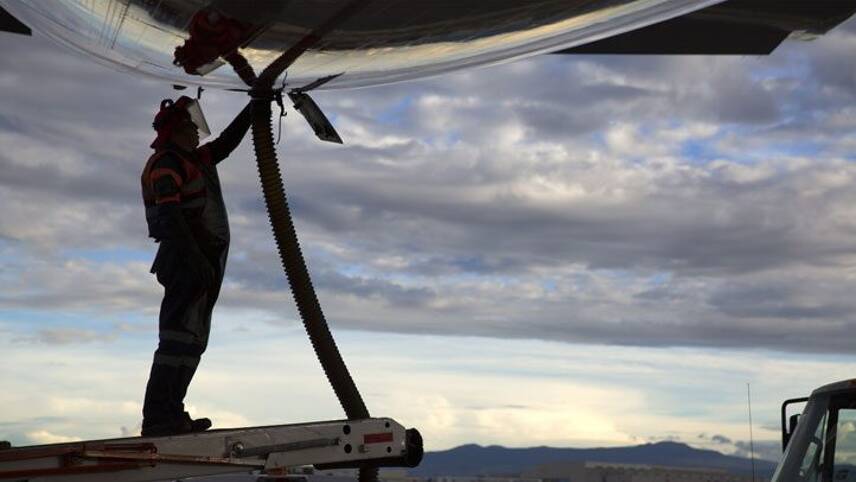Register for free and continue reading
Join our growing army of changemakers and get unlimited access to our premium content

The first flight using blended biofuel took place in 2008. But
Launched on Tuesday (20 April), the Sustainable Aviation Buyers Alliance (SABA) is being operated by the Environmental Defence Fund and Rocky Mountain Institute, with support for the Climate Group, best known for schemes such as RE100 and EV100.
The aims of the alliance are multiple but are all designed to accelerate decarbonisation in aviation. SABA will unify the voices of buyers and potential buyers, encouraging governments and fuel producers to support increased production of low-carbon kerosene alternatives. It will also help members with technical information on topics such as fuel specifications, policy requirements and emissions accounting, while developing a pathway to make SAF investments simpler.
Forms of SAF expected to be supported include bio-based fuels, waste-derived fuels and hydrogen. Boeing, one of the inaugural members, is notably planning to debut commercial aircraft capable of using 100% biofuel by 2030. Commercial planes at present can only use blends of up to 50%.
“SABA adds momentum to existing airline-company partnerships that support the purchase of sustainable aviation fuels,” Environmental Defence Fund’s vice-president for the global climate programme, Kelley Kizzier, said.
“SABA will build on the work of these early movers, many of whom seek a more scalable, standardized approach, by establishing a SAF certificate system with robust environmental criteria. Working with sustainability certification schemes, this system will verify and track emission reductions from SAF so that companies, organisations and even individual travellers can achieve their ambitious climate goals.”
Aside from Boeing, the Alliance has seen sign-ups from Boston Consulting Group, Deloitte, JP Morgan Chase, Microsoft, Netflix and Salesforce. Several of these firms have announced new climate targets or initiatives in recent times.
JP Morgan Chase announced plans to provide more than $2.5trn to sustainable development projects by the end of 2030 earlier this month. Netflix, meanwhile, set a 2022 net-zero target in March, less than a year after hiring its first sustainability officer.
Microsoft’s carbon program manager Elizabeth Willmott, similarly, said SABA is one of the “innovative new solutions and partnerships” the firm will need to meet its 2030 ambition of carbon negativity.
“As a corporate buyer and vocal supporter of high-quality SAF, we’re pleased to join together with companies leading on climate action to support SABA’s mission to decarbonize aviation and ultimately, increase SAF production and adoption,” Willmott said.
The SAF debate
Aviation is only responsible for 3% of annual global emissions. But pre-pandemic, it had been one of the world’s fastest-growing sectors in terms of both passenger numbers and financial success, and climate impact. It is regarded as hard-to-abate.
SAF has been backed by a string of airlines, investors, fuel producers and policymakers. Last year, members of the UK Sustainable Aviation pledged to achieve net-zero carbon emissions in the sector by 2050, to assist with the UK’s overall net-zero strategy.
A roadmap to accompany the launch suggests the sector believes it can accommodate a 70% increase in passengers by 2050 while reducing carbon emissions from more than 30 million tonnes a year to net-zero. New aircraft and engine technology and smarter flight operations have been heralded as some of the solutions to support the transition.
With Covid-19 in mind, the roadmap was supported by MPs, who asked the DfT and Treasury to provide £500m of funding for SAF alone as part of its green recovery planning.
But SAF is not universally accepted as the only – or predominant – solution for decarbonising aviation. The UK’s Climate Change Committee (CCC) has recommended that the nation also caps demand growth and adds international aviation to annual carbon accounting. Ministers have thrown out this former recommendation but finally adopted the latter this week, in agreeing to the CCC’s Sixth Carbon Budget advice.
On the technology side, other options are more efficient aircraft, used in conjunction with carbon offsetting; hydrogen planes and fully or hybrid-electric models. The former option is already available, although carbon markets will need to scale if this approach is to be scaled. Hydrogen and electric planes, meanwhile, will likely take several years yet to commercialise.
Sarah George


Burning bio-fuels *still* puts CO2 in the atmosphere – this is not "low carbon